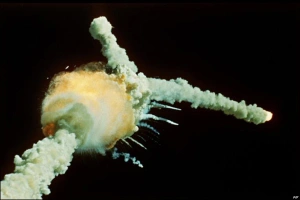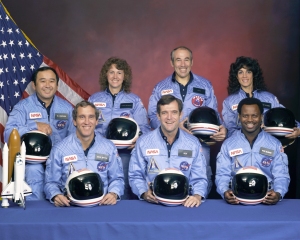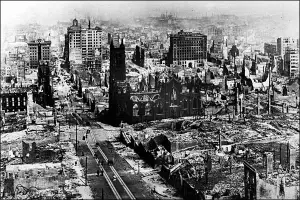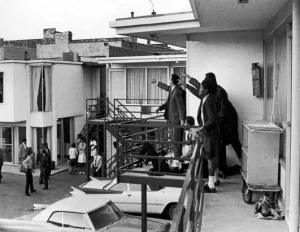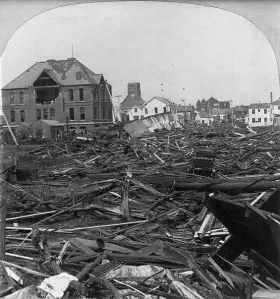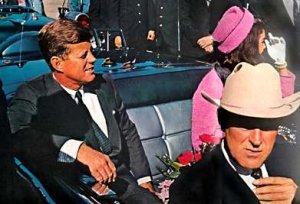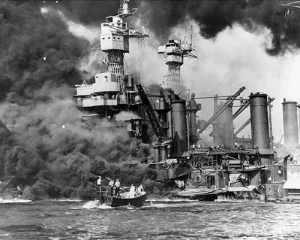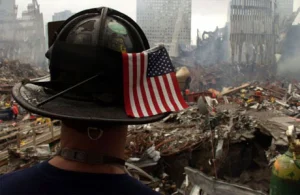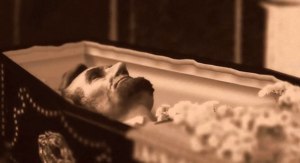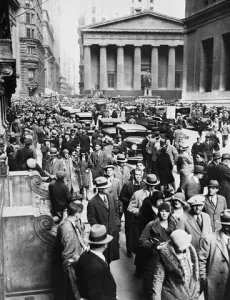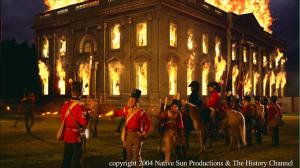
The flag of Iceland, in the Flag Court at the Commons
I’ve only been to one foreign country in my entire life, and I had to miss watching the Orioles win the World Series to get there, but I wouldn’t trade the experience for anything.
In the summer of 1983, I was a nineteen-year old working in passenger service for Butler Aviation (handled today by Signature Flight Support) at BWI Airport. I was one of perhaps a dozen pax service reps, with a number of kids my age, and we acted as the on-site crew for charter flights and airlines with limited service, such as Air Jamaica and Icelandair. It was a pretty good group, mixing youth with experience and we were good at what we did. Generally, we had a great time, mixing in laughter with the work, meeting interesting people from around the world, in the easy days before international airports were high security facilities.
A lot of my most interesting memories are from this time in my life. Probably the best is when the wonderful folks at Icelandair decided to send a few of us (myself, Lisa Merkey and Debbie Hutton) to Iceland for the weekend, all expenses paid. We were informed late that summer, and since none of us had passports, we had to hustle down to an office in Washington to get them. If I remember correctly, it didn’t seem like much of a hassle at the time (except for going into Washington). We were scheduled to leave on Friday, October 14, providing our flight had open seats (being freebies, they wouldn’t let us be the reason seats weren’t sold, but this is standard airline procedure, and we understood).

As the date of departure approached, the Orioles advanced through the playoffs. My future wife and I saw games 1 & 2 of the American League Championship Series at Memorial Stadium. The Birds lost Game 1, but came back to take Game 2. It suddenly occurred to me that I might be in Iceland as the Orioles played for a championship; I was uneasy at this, but never once considered passing up the chance of a lifetime to watch baseball. What if I turned this opportunity down and they lost?

When the appointed day arrived, we arrived at the airport, luggage in tow, to work the flight that would eventually take us across the ocean. We knew from the passenger list that we would probably make the flight, unless people showed up at the last minute wanting a ticket (you could do that back then). Iceland in the fall is not a popular tourist attraction, so we felt pretty confident. (Why did people go to Iceland at all? Icelandair offered inexpensive continuing service to Luxembourg, in the middle of Europe, as long as you didn’t mind a stop in “Ísland.” At the time there was little service to Europe from the area, so this was a popular option.)
That night was also the third game of the World Series, which the Orioles won 3-2, putting them up in the series 2-1 over the Phillies. I was a huge O’s fan, and now it seemed entirely possible that they could win it all before I got back home to see it. It was dangerous to think this way, but I was pulling for one Philadelphia win, so that the series would return to Baltimore.
The flight left late at night, and when we got on, because we were left to open seating, the three of us were scattered throughout the 707. On the bright side, however, we were given a stack of free alcohol coupons! (See the bottom right corner of the photo above.) I was feeling very grownup and worldly, so I used mine on Grand Marnier, which helped me doze off.

I woke up in the wee small hours of the morning, and looked out of the window at a vast unbroken whiteness. This was Greenland. I was too excited to return to sleep. Just before the sun rose, I snapped this photo:

A few hours later, it was Saturday morning. The plane touched down at Keflavik Airport, and the pilot announced that the temperature outside was 43°. I was shocked; I was in Iceland and that was no different than Baltimore in December. What he didn’t tell us was that the winds were blowing at about 20 miles per hour, and they cut right through you. There was no jetway, just roll up stairs on the tarmac, so the frigid air punched me in the face as soon as I stepped out of the plane.
After getting our bags, we took a van to the Hotel Loftleiðir, which wasn’t plush, but that didn’t matter, because we were in Iceland.

The view from the hotel was amazing. The countryside appeared nearly flat, except for the beautiful ice-covered mountains visible from my window. Here’s a picture I took:
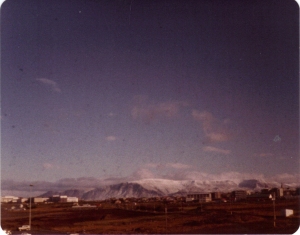
We didn’t have much time, so that afternoon we went out to see the town of Reykjavik. Reykjavik is Iceland’s capital and its largest city, but of course, this is relative. To us it seemed like a quaint, small town. It also seemed as if every business was closed. (We later found out that closing for the weekend was the norm.) We walked around the small streets and took in the chilly, windy atmosphere. Soon we found ourselves at the water’s edge, where I snapped this photo:

We were hungry, and finally found what appeared to us to be a small delicatessen that was open; the shop specialized in salads and fish. I ordered a fish sandwich, and tried to tell the young lady who took my order that I didn’t want lettuce. Having left my Ensk-islensk Vasaordabok (English-Icelandic Dictionary) in my hotel room, I couldn’t come up with the word. (Icelandic is the language of the original Viking explorers, almost perfectly preserved today.The only Icelandic word I remember today is þakka þér fyrir, which sounds like “thakka thair feerer” and means “thank you very much.”) As it turned out the word was salat. Salat/salad. I felt stupid.
Continuing our walk around town, we were struck by the lack of trees, shrubs and animals, which no doubt are made rare by the biting cold. Here are some pictures I snapped as we walked:



After a time, we saw this large tower on the top of a slight rise that looked like a promising tourist attraction, so we made our way to it:


As it turns out, this is a church with a statue of Leif Erikson in front of it. The statue was a gift from the United States in 1930:
The church was unlocked, and we climbed to the open windows at the top (stronger, even colder winds up there), from where I took this photo:

At this point we were frozen solid, and since nighttime, with its promise of even more frigid weather, was closing in quickly, we decided to head back. With some difficulty we hailed one of the few taxis, which returned us to the hotel. This was another strange experience. As the cab idled in front of the hotel, and we tried to figure out how much kronur we owed, the meter kept running, changing the total. Kronur is worth a lot less than dollars, so every time we looked up, the number seemed outrageously higher. Eventually we threw a bunch of Icelandic money at him and dashed out of the cab. We knew we had probably overpaid, and that we had probably been taken advantage of, but we were foreigners, and teenagers at that. What could we do?
When I got back to my small, sparse hotel room, I discovered a radio built into the wall above my bed; soon I was on Armed Forces Radio, listening to the Orioles game. I only heard a couple of innings, however, before the ladies arrived to pick me up for another cab ride, this time to the Club Broadway in Reykjavik.

The Broadway was smoky, loud and crowded, a place where people had no problem invading your personal space and putting their hands on you, which, as an American, I found very awkward. A live band was playing American music badly, and we soon found a few open seats at one of the long tables. I went to the bar and ordered a vodka and orange juice, which was made as an Old Grand Dad and orange juice. After much struggle to explain what I wanted, I settled for a gin and tonic.
When I got back to our table, I found myself seated next to a chatty Icelandic guy in his early twenty’s who considered himself a bit of an expert in things American. He spent the next hour explaining to me that America had been infiltrated by a vast Ku Klux Klan conspiracy; he even showed me, by tearing apart his pack of Marlboro cigarettes, how they sent secret messages to each other using the colored circles on the inside flaps of the box. I listened politely before excusing myself to get another gin and tonic. After a few more hours of smoke, loud music and screaming at the person sitting right next to you, we headed back to the hotel, exhausted from our long day.
The next day we stayed close to the hotel, because we had a flight to catch. I did a little shopping at the hotel store, where I discovered, after finally figuring out how to convert kronur to dollars, that my cokes were costing me six dollars each. On the other hand, a nice wool scarf (which I still have) and a jar of caviar were dirt cheap. (I didn’t get the caviar because I was down to my last ten kronur, which didn’t buy anything. I still have it:

Finally, it was time to check out and head to the airport. Here’s my hotel tab and receipts from what little shopping I did:


And here are my souvenirs:

On the flight home, the ladies took the last two open seats and I got the “jump seat.” This is a fold-down seat located directly behind the cockpit. It wasn’t very comfortable, but I was happy to be on the plane at all. Another perk to being up front with the crew is that when we descending into O’Hare in Chicago, I was called into the cockpit. The pilot pointed out the window excitedly and said, “Loook. See-Ka-Go, See-Ka-Go!” As I peered curiously through the clouds, I began to see the entire city of Chicago, sitting on Lake Michigan and laid out before us. I thanked the captain for his thoughtfulness; it was a nice touch.

In Customs at O’Hare, I found the first American man and asked, “I’m from Baltimore. Have you heard about the World Series? What’s going on?” Gruffly, he said, “Yeah, I dink you guys won it.” And that was how I learned that the Orioles were World Champions. We got into Baltimore in time to see the buses from Philadelphia arrive at Memorial Stadium, where they were attacked by the throngs of fans who had been waiting all night. I was later told by coworkers that BWI had broadcast the end of the game on monitors around the terminal, and that when the last out was made, the concourses shook.

No matter. I had my memories of a very cool weekend in Ísland (take that however you want to), and I wouldn’t have traded it for the world, not even for the World Series.
























